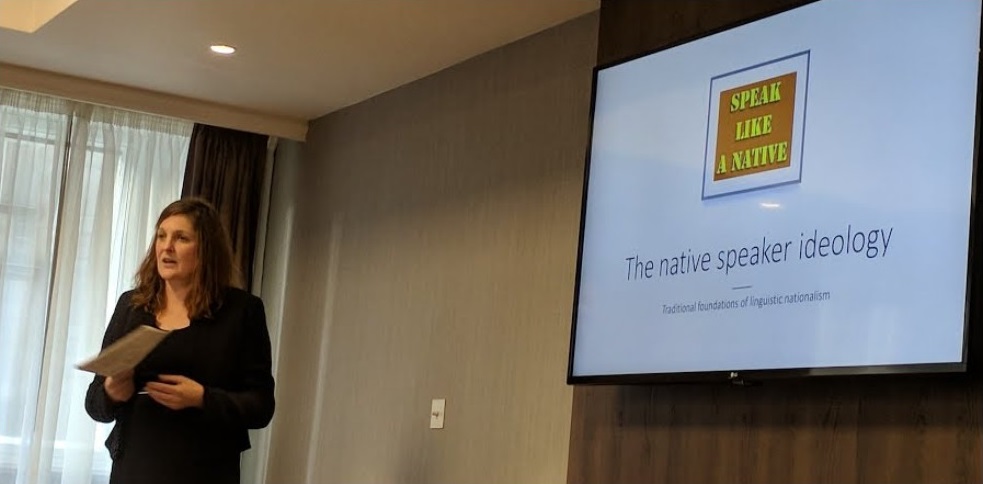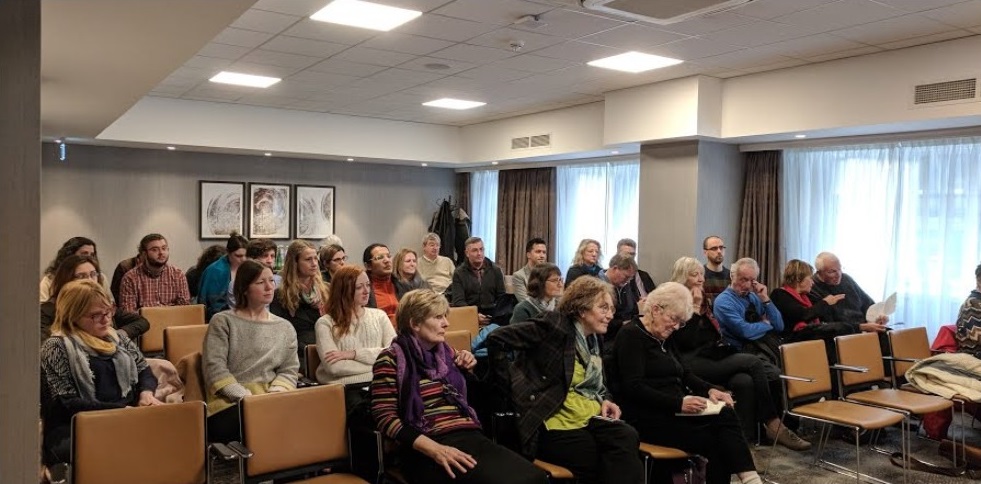Event report
On 25 November we welcomed Professor Bernadette O’Rourke to our CIOL Scottish Society event in Edinburgh. She is Professor of Sociolinguistics (with Spanish) at Heriot-Watt University. Her research interests focus on the role of language in the construction of social difference and social inequality in multilingual societies and has published widely in this field.
Her presentation Who has the authority to speak? – Linguistic intolerance, anonymity and monolingual regimes was received with interest and enthusiasm both by the audience present and virtually in social networks.
Professor O’Rourke discussed how the definitions of ‘native speaker’, ‘mother tongue’ and ‘linguistic competence’ are all narrowly defined and framed under a monolingual framework.


She discussed the Gaelic Language Plan that the City of Edinburgh Council is trying to put in place for the next five years. Discussing about Gaelic Medium Education, she provided examples of the ideologies behind the comments made by the general public on social media, which amused the audience. Some of the engrained ideas amongst the general public are that English is the dominant language and that children learning in Gaelic will be at disadvantage with those learning in English. She argued that there is evidence that children taught in Gaelic perform better than those being educated monolingually. Subsequently, she proceeded to discuss linguistic intolerance and provided a few examples of the languages which ‘should be spoken’ and the controversies arising from some of the examples given, such as instances of verbal and physical abuse to people who had been attacked for not using English. It was great to see how such controversial matters were presented, leading to the audience being clearly engaged. From local examples, she continued by presenting similar instances of further afield. We heard examples of intolerant regimes making calls for the language of the country to be adopted by immigrants from arrival, arguing that this is a mark of national identity.
There was also some discussion about if and how should we react to instances of linguistic intolerance. Moving from ‘legitimate language’ to the ‘legitimacy of speaking that language’, Professor O’Rourke questioned who has the authority to speak or who grants the authority to speak. These ideas are closely related to ‘nativeness’ and the idea of being ‘the perfect speaker’ with perfect grammar skills, and so on. Very interestingly, she joined these ideas by inviting the audience to question the legitimacy of the non-native speaker and what legitimacy does the non-native speaker have to speak, read, write, translate or teach a language. Questions relating to ‘having an accent’ for example, and truly belonging (or not) to the inner group also reveal issues in the areas of equality and access. Does someone without a good command of the language have the same access as a native speaker to the job market and/or other services?
Reflecting on the different terminology that has been used to date to denominate the idea of ‘non-native speaker’ and the shift from using terms such as ‘non-native speaker/L2 speaker/2nd language speaker/learner’, she explained how a larger European network composed by several researchers (COST New Speakers[1]) coined the term ‘new speaker’. The term ‘new speaker’ is used to describe people who adopt and use a language variety which is not their native language. Researchers decided to move away from the deficient ‘non’ terminology used to date, which they believe has negative connotations as opposed to ‘new’, which has a fresher and more positive approach. She also acknowledged that some speakers might decide to drop the ‘new’ part of the terminology depending on how long they have been learning the language, for example. It was highlighted that their purpose is to reinforce that ‘new speakers’ have the same authority and legitimacy to speak as native speakers.
She also drew upon old myths of the harms and disadvantages for children to be raised bilingually and reinforced the positive aspects of being multilingual and the creativity associated to it. Issues related to proficiency and how it is defined and speakers adopt it, as well as the definition and assessment of fluency were also discussed.
We were also reminded of the ‘adoptive language[2]’ project, a EU project lead by Maalouf[3] (2008) in which European citizens were invited to adopt a minoritised language, perhaps a language which is more difficult to learn and speak, in an attempt to sympathise with what the language learning process really means.
Professor O’Rourke concluded her presentation stating that linguists not only need to reflect on practical issues related to monolingualism and multilingualism but that we need to act when witnessing instances of linguistic intolerance as we have a moral obligation to educate people and to raise awareness of something that is so deeply engrained in the ideology. Quoting a Tweet by one of our attendees it seems that “we need a revolution to change things”.

Eneida Garcia Villanueva MCIL ACIL Chartered Linguist
[3] Maalouf, A. et al. (2008). A rewarding challenge: How the multiplicity of languages could strengthen Europe.
Who has the authority to speak? – Linguistic intolerance, anonymity and monolingual regimes
Presentation by Professor Bernie O’Rourke, Heriot-Watt University, on Minority Languages.
Overview
Over recent decades there have been important changes taking place in the linguistic ecologies of contemporary societies. This is as a result of globalization, increased mobility and transnational networking. There have been attempts at transnational and national levels to address the opportunities and challenges brought about by increased linguistic diversity, the management of such diversity on many levels is still influenced by the traditional foundations of linguistic nationalism. Such foundations have tended to be based on the principles of linguistic homogeneity, nativeness and monolingualism. These principles have kept in place a social order which has come to be characterized by socioeconomic hierarchies and inequalities with linguistic difference playing a key role. Such principles also constituted and continue to penetrate the basic epistemologies of linguistics itself, giving primacy to the “native”, “first language”, “mother tongue” speaker of a language as a linguistic model over the “non-native” or “second language” speaker. As a result, the social and linguistic practices of “non-canonical” speakers have been at best ignored and at worst disparaged (O’Rourke and Pujolar 2013).
In the current social and political climate we are seeing an even greater return to monolingual regimes leading to linguistic intolerance at many levels. In this talk I will examine the ideologies behind such intolerance and why certain profiles of speakers (new speakers, native speakers) and users of particular languages (majority or minority languages) are given more authority than others. I will draw specifically on the concept of anonymity as explored by Gal and Woolard (2001: 6) which they use to refer to the “ideological foundation of the political authority of the Habermasian bourgeois public sphere” (which supposedly includes everyone but which in fact gives voice to some speakers and not to others).
Speaker bio
Bernadette O’Rourke is Professor of Sociolinguistics (with Spanish) at Heriot-Watt University. Her research interests focus on the role of language in the construction of social difference and social inequality in multilingual societies. She is the author of numerous publications in this field including Galician and Irish in the European Context: Attitudes Towards Weak and Strong Minority Languages (Palgrave Mcmillan, 2011). She is Chair of the EU COST Action IS1306 New Speakers in a Multilingual Europe: Opportunities and Challenges (2013-2017).
Programme
Lunch: 12.00-2.00pm
Talk: 2.00pm-4.00pm
Those willing to join us for lunch at the The Bella Italia restaurant (very near the hotel, at the junction of North Bridge and the Royal Mile) are more than welcome to do so. This is a good opportunity to get to know each other and network. Please note that while attendance at the afternoon session is free, individuals are required to pay for their own lunch.
Booking
This event is free, but you must book in advance.
There are two ticket types, indicating whether or not you will attend the lunch (which individuals are required to pay for).
19 North Bridge
Edinburgh, EH1 1SD
United Kingdom
Events +
|
